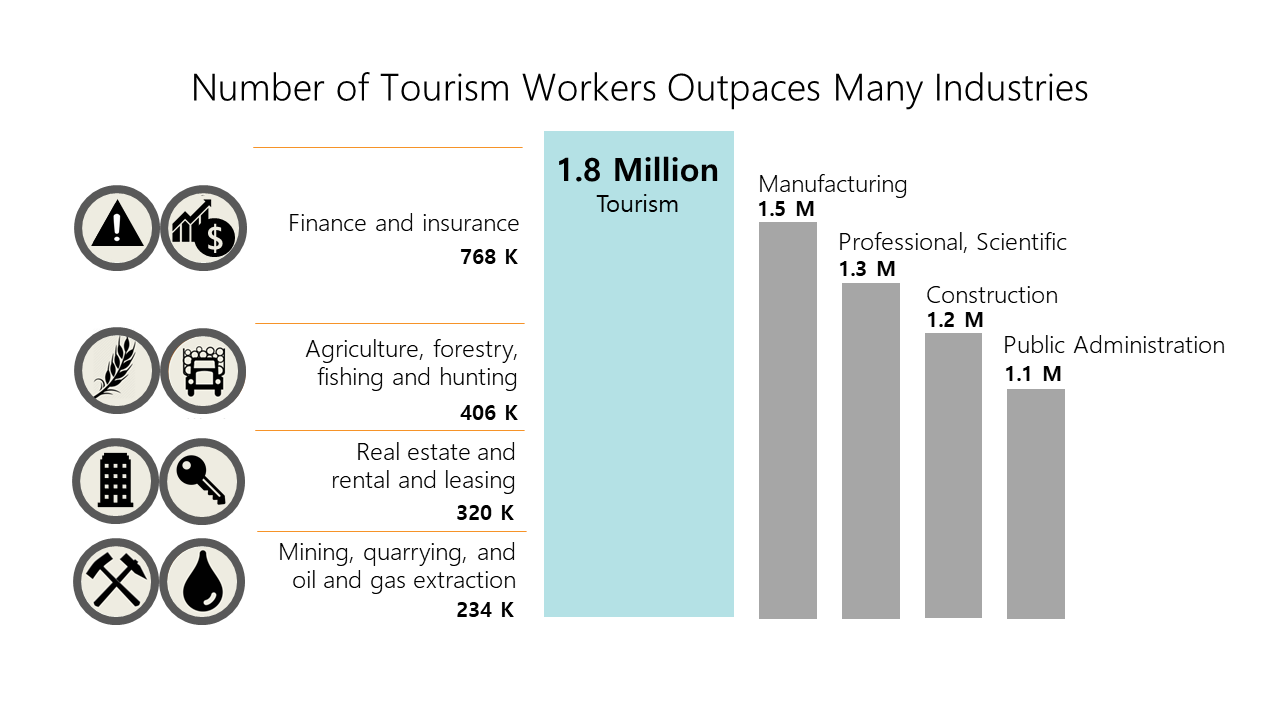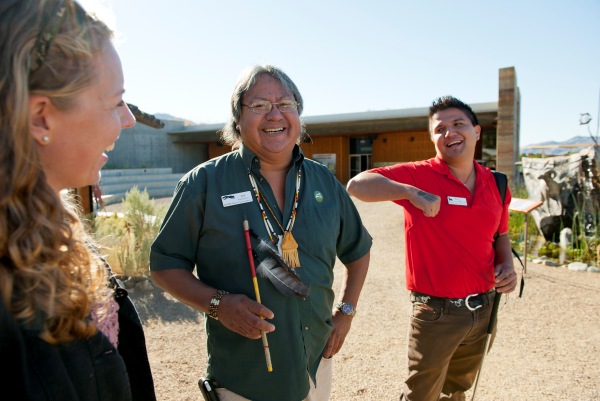Tourism comprises 10% of Canada’s workforce—1.8 million workers in 200,000 workplaces. Between accommodations, food and beverage services, travel services, recreation and entertainment, and transportation, tourism industries generate nearly 5% of Canada’s GDP.
Tourism is synonymous with Canada’s identity: it emphasizes social capital and cohesion, promotes inclusion and diversity, and contributes to cultural and heritage preservation.
The International Labour Organization reports that the “high intensity of labour within the industry makes it a significant source of employment and places it amongst the world’s top creators of jobs that require varying degrees of skills and allow for quick entry into the workforce [by under-represented groups]”.

Tourism is outpacing the growth of many sectors worldwide. Investment in the development of tourism products and services is an investment in jobs that help rebuild and transform communities and create economic prosperity. Tourism can create meaningful employment that is accessible to everyone, increasing participation rates in an ever-expanding global economy, while helping incentivize investments in infrastructure and rapidly advancing technology. Increasingly, the tourism sector has become Canada’s classroom for “first jobbers”, providing rich learning experiences that help individuals gain social and employability skills that last a lifetime, and that communities rely on to showcase, preserve, and strengthen local traditions, customs, and culture.
Although tourism attracts many young people and individuals seeking their first Canadian work experience, it also attracts many more—those seeking interesting careers and opportunities that support personal interests or lifestyle needs. With more than 400 types of jobs in the sector, there are opportunities for nearly everyone.
Canada’s Tourism Sector: Number of Workers by Industry
| 40,000 | 163,000 | 287,000 | 394,000 | 949,000 |
| Travel Services | Accommodation | Transportation | Recreation & Entertainment | Food & Beverage Services |
(Source: 2016 Canadian Census)
Young people, students, individuals in transition, and others entering the Canadian workforce for the first time often look for tourism jobs that offer flexible hours so they can accommodate other scheduling demands (such as education or childcare). Individuals seeking permanent, full-time, stable employment are drawn to the variety of tourism professions in outdoor recreation and adventure, events and meeting planning, hotel or food and beverage operations, transportation, travel services, and more. Entrepreneurs are attracted to the sector because it’s good business: the demand for uniquely Canadian tourism experiences is boundless. Mature and retired individuals seek tourism jobs to augment incomes, stay connected to communities, mentor young people, and remain active.
Tourism will continue to be a prosperous economic sector for all regions of Canada. The growth of the visitor economy is outpacing many industries worldwide. Canada is poised to gain a much larger share of the global tourism market and increase its global standing and competitiveness—but to succeed must first attract, develop, and retain talent.
There are many economic, social, and political factors as to why tourism is important—all reasons why investing in tourism employment is important to Canada. Here are the top ten:
- Tourism has high job growth potential. Tourism offers jobs that fit personal lifestyles and needs: accessible, entry-level jobs that enable people to earn an income while studying or in transition; stable, well-paid, middle-class jobs with highly sought transferable skills and multiple career paths; C-suite roles for those seeking leadership and advancement opportunities; or employment for individuals looking for adventure and wanting to augment their income.
- Tourism provides economic and business development or entrepreneurial opportunities that can help transform waning economies and increase economic diversification. Communities dependent on declining industries are looking to tourism as a sustainable alternative. Tourism draws on the expertise of local people to provide authentic, tailored, compelling, quality experiences. Visitors are attracted to destinations for much more than the vista: they seek transformative experiences involving local culture and customs. Diversifying economies involves an investment in human capital by reskilling or upskilling workers, thereby transforming the local workforce. Because tourism builds on local resources, it can help create reliable and stable income in a region.
- Tourism employment is multifaceted and provides a rich learning experience. People in tourism acquire ‘skills for life’: skills that are in demand and transferable to many jobs and help people participate in society or transition into other professions. Tourism operators invest in training to enable people to gain the language skills, Canadian workplace experience, and job-related skills to succeed in the workforce and advance their career prospects.
- Tourism offers social advantages. Canada’s tourism sector is highly diverse. Compared to the economy overall, tourism employs a higher percentage of under-represented groups in long-term, well-paid, skilled jobs. Tourism employment is one of the most important social structures that helps groups better integrate into society and the world of work. Because of the broad range of products and services, there are multiple career and worker pathways that enable people to advance rapidly.
- Tourism promotes environmental benefits. The products or services offered by many tourism businesses are based on a sustainable business development model. Tourism businesses factor in land use planning and conservation, waste reduction, and eco-efficiency to help reduce ecological impacts. For many, their reputation and the very ‘experience’ they offer capitalize on the fact that they are environmental stewards.
- Tourism creates an influx of wealth that contributes to the local economy overall. Income from tourist activities has a significant “spin-off” effect. Money spent on tourism fuels economic activity in many other sectors. For example: infrastructure demands lead to construction jobs; tourists seek additional services in banking and retail; and specialized tourism—such as health tourism—requires increased capacity.
- Tourism is a stimulus for infrastructure investments. The influx of new wealth derived from tourism enables communities to invest in infrastructure improvements that will serve more than visitors. Improved roads, expanded technology and communications networks, revitalized community areas, and other investments boost the quality of life for all citizens.
- Tourism contributes to political stability and is synonymous with Canadian identity. Scholars have long studied how tourism is a means for political and ideological goals. For example, Edgell (1990) asserts, “the highest purpose of tourism policy is to integrate the economic, political, cultural, and intellectual benefits of tourism cohesively with people, destinations, and countries to improve global quality of life and provide a foundation for peace and prosperity.” In many ways, the Canadian tourism brand is built on a reputation of political stability and safe and secure conditions. Consequently, tourism is synonymous with Canada’s identity: it embodies the very values or ideals that define Canadian culture. Tourism businesses create opportunities for multicultural experiences and the ability to gain skills for cross-cultural dialogue and collaboration.
- Tourism has good jobs and jobs at a premium. Good jobs are those with safe working conditions and stable, predictable incomes based on competitive salaries/wages. Good jobs provide opportunities for advancement, have flexible working hours, and accommodate personal needs. Progressive employers invest in ongoing training or professional development, offer health benefits, and create an inclusive culture. These very traits are characteristic of tourism workplaces. Many tourism jobs are also gaining prominence because of the increased value placed on personalized service (especially in a time of increased automation and use of artificial intelligence) and public safety and security. For example, tourism workers are in roles that involve critical surveillance, such as hotel room attendants, taxicab drivers, or front desk agents. Others help monitor and manage a vulnerable food supply chain or provide shelter in times of disaster.
- Tourism is everywhere. Tourism employment exists in every corner of Canada. Tourism is foundational to the future of Canada’s economy, with jobs that will continue to flourish even when other industries decline.
Not only is tourism important to Canada’s economy, it is uniquely positioned to increase social capital and contribute to political stability. Bottom line: tourism employment shapes Canada’s identity by helping transform lives and communities. Investments in attracting, developing, and retaining workers are needed beyond the investments made for infrastructure or incentivizing private investments. The sector (and indeed Canada) cannot thrive without a resilient and diverse tourism labour market.
Learn more about all that tourism has to offer at Discover Tourism.

